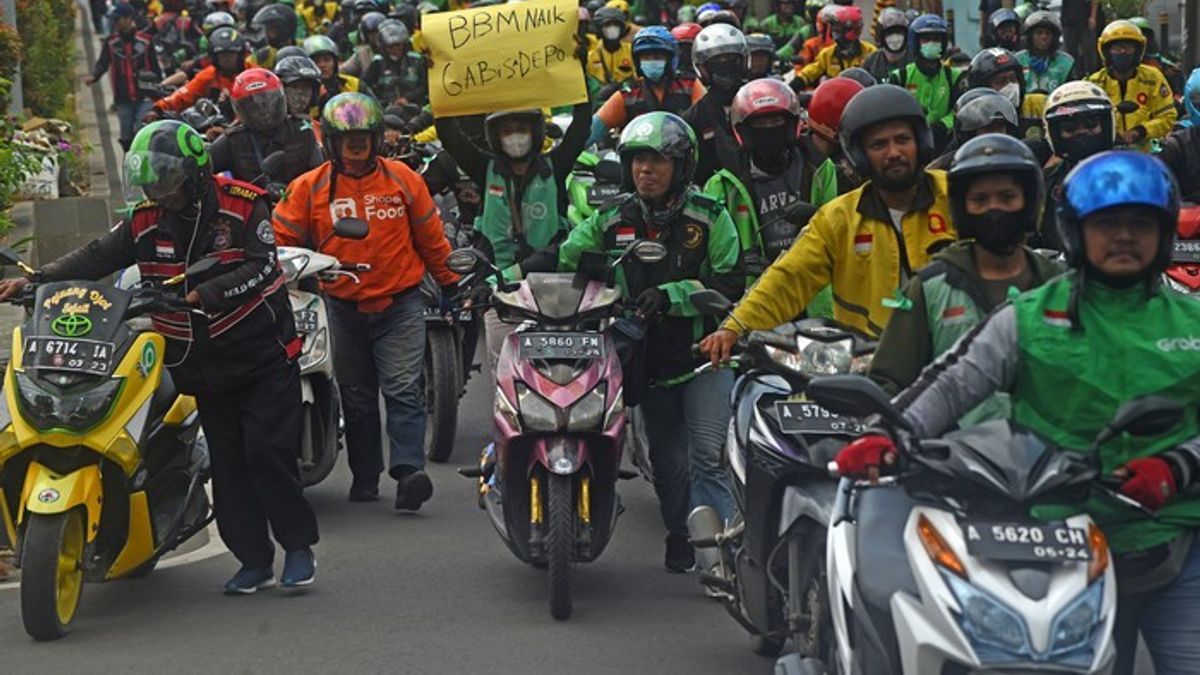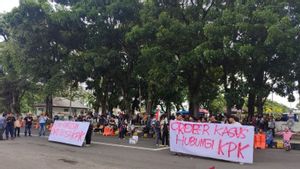JAKARTA - Today's memory, seven years ago, November 9, 2016, the Minister of Transportation (Menhub) Ignasius Jonan banned his operation of online taxis and motorcycle taxis (ojol). The ban comes because the ojol is not in accordance with Law (UU) Number 22 of 2009 concerning road traffic and transportation. Black plate cars cannot be used as public transportation.
Previously, the presence of ojol was greeted with great fanfare. His presence was able to answer the need for transportation that was fast and affordable. Even so, not a few parties are against ojol.
The Indonesian government often enjoys providing adequate access to public transportation. The existing public transportation is sometimes not maintained. The impact is everywhere. Many people prefer to use personal transportation rather than the general public.
Fast access and no need to crowd is the reason. The gap was glimpsed by a national and foreign start-up company. Various applications known as ojol emerged Grab, Uber Gojek, and so on.
The company perpetuates many ideas so that private vehicles in the form of cars and motorbikes can be transformed like public transportation. The presence of ojol was also greeted with high enthusiasm. Mainly, in big cities.
Those who initially relied on public transportation began to switch to ojol for daily activities. Affordable and practical prices are the main consideration. Moreover, recently the tariff war was rolled out. All startups participated in the spread of promotional prices.
The only one who benefits is ojol users. Increased ojol users also began to make the position of ojol drivers a promising job. Many people have started registering. High income embels are considered attractive.
In Indonesia, Uber services launched in August 2014 immediately skyrocketed. Now they have 10 thousand units of fleets operating in Jakarta, Bandung and Bali. In the midst of limited means of transportation that are comfortable, taxis and ojols are like oasis besides being an attractive business opportunity.
For many unemployed, this service is a new hope. Gojek, for example, serves 400,000 transactions a day. You can imagine the multiplier effect economically," wrote the Tempo Magazine report entitled Ban on Ojek and Online Taxis (2015).
It may be that all Indonesian people welcome ojol. However, not for the Minister of Transportation, Jonan. Instead, he said that ojol is not worthy of operating on Indonesian roads. Jonan said black plate cars and motorbikes should not be used as public transportation. This violates the traffic law.
Jonan was impatient. He issued a notification letter confirming the prohibition of ojol paving on November 8, 2015. The prohibition provoked reactions from many parties. President Joko Widodo (Jokowi), especially since Jonan's decision was widely criticized, then the decision was rushed to be withdrawn in December 2015.
Previously, the Ministry of Transportation issued a notification letter Number UM.302/1/21/Phb/2015 regarding motorcycle taxi operations that were not in accordance with Law Number 22 of 2009 concerning Road Traffic and Transportation and Government Regulation Number 74 of 2014 concerning Road Transportation..
The letter was dated November 9, 2015 and was signed by the Minister of Transportation Jonan and copied to the Traffic Corps of the Police, the Governor and Kapolda throughout Indonesia. Director General of Land Transportation Djoko Sasono said that with the letter issued, online motorcycle taxis were no longer allowed to operate," it was written on the Cabinet Secretariat website, December 18, 2015.
VOIR éGALEMENT:
The English, Chinese, Japanese, Arabic, and French versions are automatically generated by the AI. So there may still be inaccuracies in translating, please always see Indonesian as our main language. (system supported by DigitalSiber.id)














